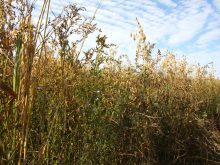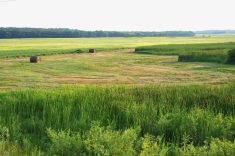Palm oil grown on recently deforested land is unlikely to be acceptable for use in European biodiesel, a draft report from the European Commission shows.
The environmental standards add to a growing list of challenges for Asia’s palm industry, including Indonesia’s $1-billion climate deal with Norway last month and consumer worries about deforestation.
The European Union aims to get 10 per cent of its road fuels from renewable sources by 2020, and seven percentage points are expected to come from land-using crops such as grains, palms or sugar cane.
Read Also

Trade uncertainty, tariffs weigh on Canadian beef sector as market access shifts
Manitoba’s beef cattle producers heard more about the growing uncertainty they face as U.S. tariffs, and shifting trade opportunities, reshape their market.
Within the next decade, that could create a $17-billion-a-year market, eyed by Asian producers.
But critics charge that the multibillion-dollar market will compete with food crops, forcing up grain prices and encouraging deforestation.
The EU’s executive arm has responded with a set of environmental standards, announced by energy commissioner Guenther Oettinger June 10.
“You cannot chop down forests and convert them to palm plantations and use those fuels to meet the EU’s biofuel targets,” an EU official said on condition of anonymity.
“Oettinger is trying to make certain that the EU biofuels strategy is credible.”
For the EU, the priority is to ensure that biofuels make a genuine contribution to cutting emissions of carbon dioxide, the main gas blamed for climate change.














